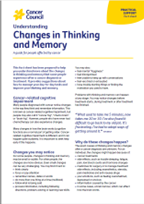- Home
- About Cancer
- Managing side effects
- Changes in thinking and memory
- Key questions
Key questions
This section answers common questions about how cancer and its treatment can affect thinking and memory.
Learn the answers to these questions:
- What is cancer-related cognitive impairment?
- What changes may you notice?
- Why do these changes happen?
- Who is affected?
- How long does it last?
- Your feelings about change
What is cancer-related cognitive impairment?
Many people diagnosed with cancer notice changes in the way they think and remember information. This is known as cancer-related cognitive impairment, but people may also call it “cancer fog”, “chemo brain” or “brain fog”. However, people who have never had chemotherapy can also experience changes.
Many changes in how the brain works (cognitive function) are a normal part of getting older. Cancer- related cognitive impairment is different, and it can happen quite suddenly. It is important to seek help early if this happens.
What changes may you notice?
For some people, changes in thinking and memory may be small or subtle. For other people, the changes are more obvious. Even small changes can be very challenging.
You may find it hard to:
- think clearly
- focus or pay attention
- remember names, dates or words
- do more than one thing at a time (multitask)
- follow what is being said
- process information, including following directions, problem-solving or learning new skills.
You may also:
- feel mental “fogginess”
- feel disorganised
- feel unable to keep up with conversations
- feel very tired or exhausted
- have trouble starting things or finding the motivation you used to have.
Problems with thinking and memory can happen at any stage. You may notice changes before treatment starts, during treatment or after treatment has finished.
What used to take me 5 minutes, now takes me 20 or 30. I’ve also found it difficult to go back to my old job. It’s frustrating. I’ve had to adopt ways of getting around it.
NAVEENA
Why do these changes happen?
The exact causes of thinking and memory changes after a cancer diagnosis are unknown. For an individual, the changes might happen because of:
- cancer treatments
- side effects, such as trouble sleeping, fatigue, pain, low blood counts and hormone changes
- medicines for surgery or to manage treatment side effects, including anaesthetics, steroids, pain medicines and anti-nausea drugs
- your emotions, such as feeling overwhelmed, depressed or anxious
- inflammation caused by the cancer
- in some cases, a brain tumour, which can affect how the brain works.
Who is affected?
Thinking and memory changes are common for people who have been diagnosed with cancer. According to one study, it can affect up to 3 in 4 people during treatment, about 1 in 3 people before treatment and 1 in 3 after treatment.
How long does it last?
Thinking and memory problems usually get better with time. Most people notice an improvement after cancer treatment has finished. For some people it takes longer, and some people continue to notice problems long term.
Generally, the changes in thinking and memory are subtle and other people may not notice. Speak to your doctor when you notice changes, or if you are worried.
Your feelings about the changes
| Coping with changes in thinking and memory | It can be challenging to experience changes in thinking or memory, even if the changes are subtle. You may not feel like yourself, which can affect your relationships with family, friends and colleagues. |
| Impact on daily life | Changes in your thinking or memory can have a big impact on managing at home, working or studying, or during social activities. This may make you feel upset, scared or frustrated. You might feel you have to put in extra mental effort and energy. |
| Reassurance and support | It may be reassuring to know that many people experience changes, and for most people it gets better with time. Even if the changes are long term, help is available (see Managing changes). |
| Seeking help | Try to be gentle with yourself and allow time to recover. You may find it helpful to speak about how you are feeling with a family member, friend or professional counsellor. You can call 13 11 20 to talk to one of our experienced health professionals about your concerns. They can also connect you with someone who has had a similar cancer experience. |
→ READ MORE: Managing thinking and memory changes
Be kind to yourself and utilise whatever resources you can. Don’t be ashamed of asking for help because it’s not your fault.
NAVEENA
Podcast: Brain Fog and Cancer
Host Julie McCrossin talks with Prof Janette Vardy, a medical oncologist, who has been studying brain fog and cancer.
Listen to more episodes from our podcast for people affected by cancer
More resources
Prof Janette Vardy, Medical Oncologist, Sydney Cancer Survivorship Centre, Concord Repatriation General Hospital, University of Sydney, NSW; Dr Heather Green, Clinical Psychologist and Health Psychologist, Griffith University, Gold Coast, QLD; Dr Adam Walker, Director, Laboratory of ImmunoPsychiatry, Neuroscience Research Australia and University of New South Wales, NSW; Brooke Russell, Principal Occupational Therapist, WA Cancer Occupational Therapy, WA; Sarah Ramsdale, Cancer Survivorship Nurse, ICON Cancer Centre Warrnambool, VIC; Johanna Jordaan, Consumer; Lesley, 13 11 20 Consultant, Cancer Council, WA.
View the Cancer Council NSW editorial policy.
View all publications or call 13 11 20 for free printed copies.

